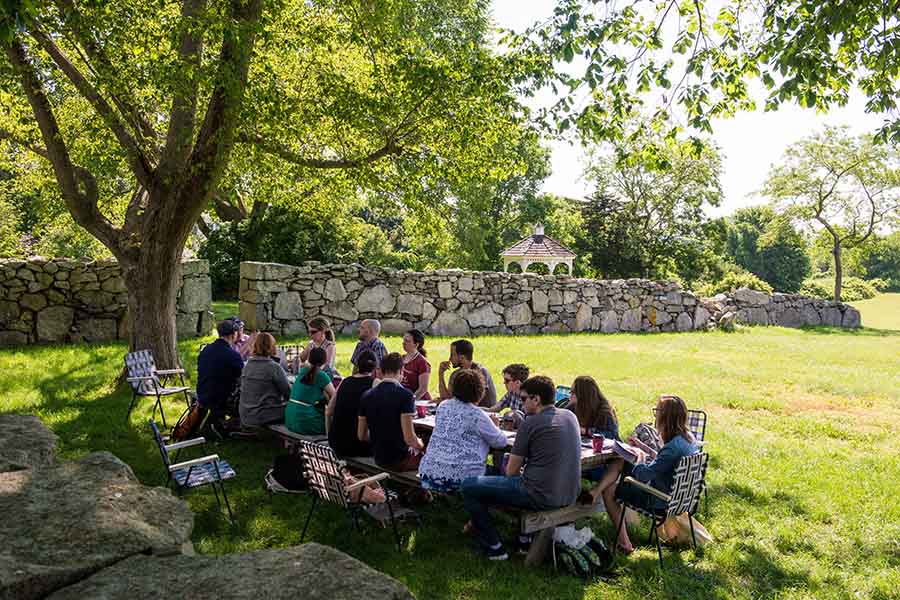1.
Chris Jones, chief theatre critic of the Chicago Tribune, sits at the head of a long table. He is our teacher for the two weeks ahead. Around him sit the 14 writers accepted into the National Critics Institute. Some already have careers in arts journalism; some have master’s degrees in theatre. I have nagging doubts about my abilities. I slump in my chair, self-conscious, and exhausted from traveling across the country all night.
After a mediocre dinner, a three-hour musical in development, and a drink at the campus bar, I make it back to the dormitory with my roommate. He’s a film critic from New York. We met a few hours ago and now we’re going to share the same room for two weeks. Back in Portland, Ore., I live alone. I have not shared a bedroom with another person I was not romantically involved with since college. I settle on my mattress, the springs press into my back.
“Goodnight,” he says.
As the darkness closes in around me I find it comforting to know that there is someone else there in the dark with me.
That I’m not alone.
2.
Our first session convenes at picnic tables under a huge beech tree, overlooking a lawn which stretches down the bay. There are two mansions on either side of us, inhabited by the administration of the O’Neill. It is the definition of old East Coast Americana. This is where the critics will meet for almost every session.
Chris launches right into an overview of what theatre criticism is, and 14 pairs of hands start furiously typing on laptops.
We take vans to a small town called Chester to take in a musical. When it’s over Chris tells us we have two hours to work on our reviews in the lobby. Eight hundred words. Due in the morning. For a while there is a serious silence among us as we work. Then there are stolen glances at everyone else working. Many of us haven’t had to write a review this long. We start to crack jokes about how inept we feel.
But when the first person closes their laptop the rest of us notice. I refocus my effort. Criticism is its own kind of performance. We get one shot to craft something that people want to read, that they learn something from, that proves we understand the art we critique. Thus we build our reputations. One review at a time.
3.
“This is a good take on a show,” Chris says. “But I think you should try to take the play head on in your next review,” he says to me.
“I don’t understand.”
“I want you to engage with the work.”
I’m too embarrassed to push the question further, so I sit quietly, hoping I’ll figure it out. Chris mentions that another critic does a great job “engaging with the work,” and I make a note of her name. We get a short break before dinner, and I pore over her piece line by line. When she makes a point she digs into it, making it clear how the script and production is or isn’t working.
By contrast, everything I say is on the surface. I realize I’m afraid to dig in, to position myself as an authority, afraid I might get it wrong.
One of the first pieces of advice Chris gave me was: “You don’t know what you don’t know. But never let anyone doubt your authority.”
4.
“Expertise is overrated,” Sarah Kaufman tells us matter-of-factly. She is the dance critic for the Washington Post, and one of only two staff dance critics in the country. We are in Massachusetts, at Jacob’s Pillow, a dance institute nestled up away in the dark, rolling green hills of the Berkshires. She’s trying to encourage us. We are stressed out about having to critique dance tonight; we pepper her with questions about vocabulary.
“Describing in detail how dancers move is boring,” she says. “You want to talk about what moves you.”
Onstage a pair of dancers move offstage. The male dancer exits, beckoning to his partner. She hesitates, raises her arms, closes her eyes, and falls forward, out of sight, into arms we cannot see. There is a tightness in my chest that I have not felt for a few months. I remember that feeling of letting yourself fall, knowing someone will catch you. Memories come rushing back, shaken loose. The body remembers what the brain forgets. You don’t have to understand dance. You just have to let it wash over you.

5.
This is how most days go: We wake up as early as possible and stare at the review we stayed up all night writing. We edit. We run out of time and send it in. Breakfast is the best meal at the cafeteria. It’s the best because it’s always the same—we know what we’re getting. Lunch and dinner, on the other hand, are a real crapshoot.
After breakfast we workshop the reviews. After lunch we have a session. We write a lot of notes and ask a lot of questions. If there is a free hour or two before or after dinner, we try to take naps or catch up with all the work that’s piling up back home, or walk down to the beach. We see a show. We scatter across campus to find a quiet place to write that has air conditioning. If we are confident, we wrap up early for a drink at the bar. Sometimes we just have a drink anyway.
6.
We talk about the ethics of criticism, the lines we draw between ourselves and theatre community. How close can we be to the artists we critique? Some of the critics here also make theatre. These lines are blurry.
We talk about Hedy Weiss, of course. Chris, her colleague in Chicago, tells us that we have a responsibility to other critics, to the integrity of the field, despite our personal feelings. I understand this argument intellectually, but all my life I’ve been told to respect the ideas of people who disrespected me.
7.
Directors, actors, and playwrights visiting the O’Neill are brought before us. Chris asks them to tell us what they don’t like about critics. We’re used to theatre artists complaining about critics, but these people don’t come to tear us down—they come to instruct. They tell us how much of themselves they invest in their shows, the hours of work that go into a two-hour performance we see only once.
“We have to believe in these shows,” a director tells us.
After a session I tell the group, “It’s funny that we’re always presented with what directors and actors and playwrights want us to know. But never the other way around.”
8.
The youngest critic is still in college. She’s the only other person of color in the cohort. She’s smarter, more confident, and way more woke than I was at her age.
What I appreciate most about her is how unabashedly she loves theatre. She is star-struck by the Broadway icons who stop by. She meets Tom Kitt and tells him that seeing If/Then was a defining moment of her life. Later she approaches Kelli O’Hara and asks for a picture. She smiles as she shows us the picture of the two of them on her phone and we smile, because it’s beautiful when someone loves something.
9.
Everyone is excited for the restaurant review day. The fact that the cafeteria food is so bland definitely plays a part in our enthusiasm. Sam Sifton, the food editor at the New York Times, give us a crash course in reviewing restaurants. Like Sarah, he tells us not to get caught up in describing how every single thing tastes.
“You’re not just describing the meal, you’re describing the course of the evening,” Sifton says.
We are paired up, given $200, and dropped off at various restaurants in Mystic, Conn. (Sadly, Mystic Pizza is not one of them.) My partner and I end up at an Italian place, mixing hearty classics with a minimalist modern ambience. We try to notice everything and whisper about it to each other across the table, making notes in our phones for later. So much thought goes into restaurants: the design, the service, the flavor combinations. Dining can be art.

10.
Chris is always telling us that the lede is the most important part of the review. They used to come easily to me, when I didn’t give them much thought, but now I stare at a blank page agonizing over how to start. I’ve never thought so much about who reads reviews, what they’re looking for, how the format and the medium influence the reader. It feels like I’m forgetting how to write as I stare at the blank page.
I’m not sleeping enough and I get headaches in the mornings. But the reviews are getting done. I’m turning over pieces longer than I’ve ever done in my short career and I’m doing it in less than 12 hours. They’re rough, for sure, but the fact I can even do this feels incredible.
11.
Workshopping 14 reviews of the same show is enlightening and frustrating.
We learn so much from each other. Different lenses, different voices, different strengths. There’s a critic who talks about music in ways that make us all jealous. We recognize each other’s paragraphs and fonts instinctually by now. As my admiration for the others grows, my self-confidence breaks apart. Every point my fellow critics makes is just another point I missed. I don’t know if I’m getting better at this.
But as the hours stretch out the enthusiasm dims and feedback dries up. We get tired. We spend most sessions outside, and the heat and humidity of Connecticut are oppressive. There are bugs. So many bugs. Our backs hurt. We get distracted. It’s not great to be at the end of the list.
By the end of the workshop we have completely dissected the show, examined every strength and every flaw. Even if I like a show, I like it less after three hours of examining it. Sometimes divisions form among the critics: those who still see the beauty in the bones left on the table and those who see only the dead body.
“Why is everyone being so hard on this show?” someone asks.
“Because we want it to be better.”
12.
Chris moderates a session with Ben Brantley of the New York Times and Peter Marks of the Washington Post. Between them these men have three of the most coveted theatre-critic jobs in the country. Their combined years of experience is laid out for us to learn from.
As they try to give us career advice, there’s a nagging thought in the back of my head. There are a handful of full-time theatre critics on staff in the country. The odds that any of us in the room might end up in one of those jobs seems infinitesimally small. One of the critics asks outright: What we should be doing to advance our careers?
“What kind of job do you want?” Ben asks.
“I want your job,” she says.
The three men look at her and then their gazes drift away for a second while they consider how to answer the question.
13.
People cry as the vans start to shuttle us in groups to the airport and train stations. I think this is what summer camp is like. (I’m just guessing, I’ve actually never been.) I have forgotten what my life back in Portland is like. As the van pulls away I look back at those left and my brain struggles to reconcile that I won’t see them tomorrow.
14.
This is what I would tell you about the critics I know.
We care. We care about the responsibility entrusted to us and we care about the art form; we could have other, better-paying jobs if we didn’t. We want to be good at this. We just spent two weeks pushing ourselves to take in as much as possible. When we walk into your show we want to like it, even if we have doubts. We want to be able to tell whoever will listen that we saw something incredible. Honestly, it makes our jobs easier.
And if we don’t like your show, we’ll do our best not to be cruel. It will sting, because you believe in your work. You have to. We get it. We have to believe in our work too.


